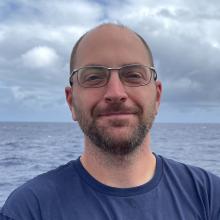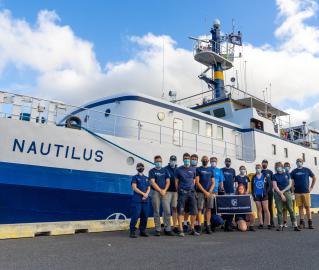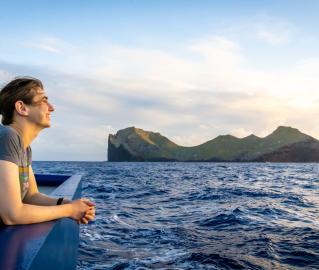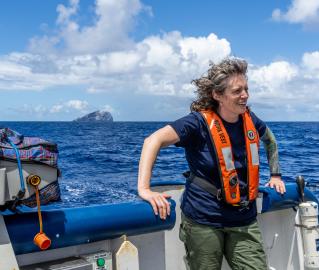
Kevin Jerram
Tell us about your work/research. What kinds of things do you do?
I specialize in seafloor and water column mapping with multibeam sonars and split-beam scientific echosounders. About half of my time at sea is spent mapping as part of broader expeditions (usually on the night watch if ROV operations are scheduled during the day). The other half is focused on calibrating and testing these sonars to maintain high data quality and make the best use of the ships time. I am very lucky to work with a wide variety of ships and vehicles all over the world and 'see' some parts of our seabed for the first time.
What sparked your initial interest in your career?
I grew up near the ocean and love spending time on boats. When I finished my undergraduate degree in mechanical engineering, I looked for opportunities to combine that background with ocean exploration and learned that we have mapped only a small portion of the seafloor in high resolution. For instance, there are certain parts of the ocean (e.g., in the polar regions) that are very difficult to access, and in some ways, we have better maps of the moon's surface than of the water-covered part of our own planet. I wanted to be part of the effort to map these areas, so I pursued a graduate program with a strong focus on the engineering behind sonar systems and now work on improving our methods for mapping the seafloor and the water column.
Who influenced you or encouraged you the most?
National Geographic's 2009 article about Arctic mapping completed changed my career. Beyond that, one quote I find particularly encouraging is from John Muir's 'Travels In Alaska': "The scenery of the ocean, however sublime in vast expanse, seems far less beautiful to us dry-shod animals than that of the land seen only in comparatively small patches; but when we contemplate the whole globe as one great dewdrop, striped and dotted with continents and islands, flying through space with other stars all singing and shining together as one, the whole universe appears as an infinite storm of beauty."
What element of your work/study do you think is the most fascinating?
In the last few years, my most exciting work has been mapping remote parts of the Arctic seafloor in high resolution for the first time. We are finding patterns on the seafloor and taking samples that give us a window into the previous glacial cycles in that region, which also help us to model how the Arctic may respond to climate change in the coming century and beyond. From an engineering perspective, it is absolutely fascinating to me that we can use sound to see a broad swath (miles across!) and learn about the oceanographic structure, gas bubbles, and other midwater acoustic targets, in addition to the seafloor shape and upper sediment structure.
What other jobs led you to your current career?
Before returning to graduate school and starting in my current research scientist position, I spent several seasons as an engineer for Shoals Marine Lab on a small island off the coast of Maine and one season as an engineer aboard S/V Westward, an educational schooner. In both experiences, I met many friends and colleagues, from deckhands to lab directors, who were extremely dedicated to marine research and highly supportive of my interest in ocean mapping. This turned out to be the perfect way to blend my interests in the ocean, engineering, and travel.
What are your degrees and certifications?
B.S. Mechanical Engineering - University of New Hampshire 2007; M.S. Ocean Engineering (Ocean Mapping option) - University of New Hampshire 2014
What are your hobbies?
Lately, I am enjoying working on my good old boat and my good old house on the coast of Maine.
What advice would you give someone who wants to have a career like yours?
Read as many books as you can find about early ocean exploration. These help me to appreciate the efforts of explorers who came before us and the incredible vessels and research programs we have now. Spend time outside, dig into your academics, and take any opportunity you can to combine your technical skills with your interest in nature. All that being said, there is simply no substitute for time at sea - so get out there!
Expeditions
Kevin participated in the following Ocean Exploration Trust expeditions:



